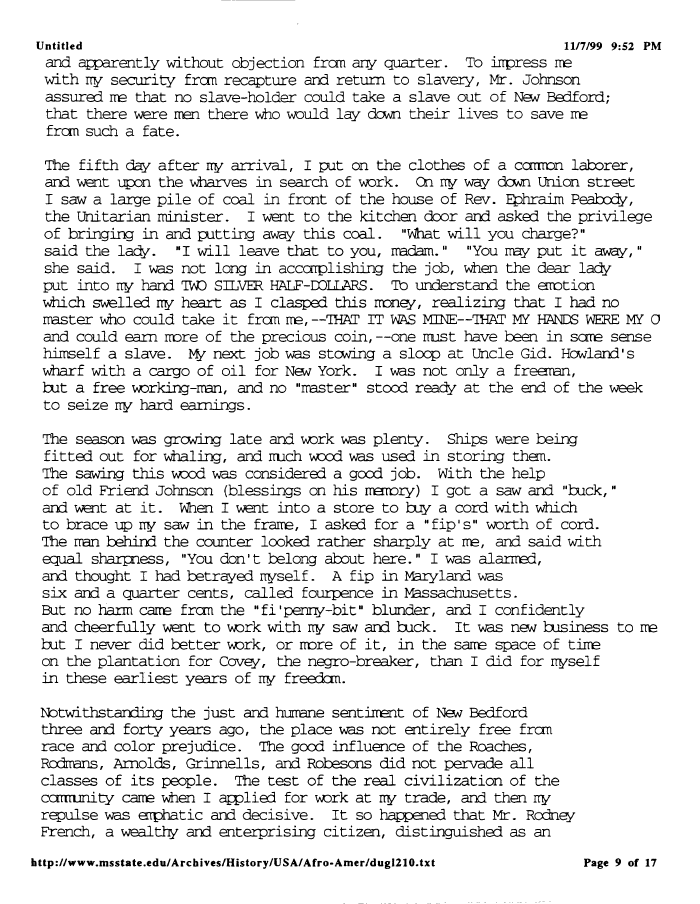 |
||||
|
TASK FORCE TO STUDY THE HISTORY AND LEGACY OF SLAVERY IN MARYLAND (Final Report) 1999/12/31 MdHR 991422 MdHR 991422, Image No: 403 Print image (107K) |
 |
||||
|
TASK FORCE TO STUDY THE HISTORY AND LEGACY OF SLAVERY IN MARYLAND (Final Report) 1999/12/31 MdHR 991422 MdHR 991422, Image No: 403 Print image (107K) |
| Untitled 11/7/99 9:52 PM and apparently without objection from any quarter. To inpress me with rry security from recapture and return to slavery, Mr. Johnson assured me that no slave-holder could take a slave out of New Bedford; that there were men there who would lay d.cwn their lives to save me fron such a fate. The fifth <3ay after iry arrival, I put on the clothes of a carrron laborer, and went upon the wharves in search of work. Cn rry way dewn Union street I saw a large pile of coal in front of the house of Rev. gphraim Peabody, the Unitarian minister. I went to the kitchen door and asked the privilege of bringing in and patting away this coal. "What will you charge?" said the lady. "I will leave that to you, madam." "You n&y put it away," she said. I was not long in accomplishing the job, when the dear lady-put into rty hand TWD SILVER HALF-DOLLARS. To understand the erotion which swelled my heart as I clasped this money, realizing that I had no raster who could take it from ire, —THAT IT WAS MUSE—THAT MY HANDS WERE MY O and could earn more of the precious coin, —one must have been in sane sense himself a slave. Ify next job was stewing a sloop at Uncle Gid. Holland's wharf with a cargo of oil for New York. I was not only a freeran, but a free wDrking-man, and no "master" stood ready at the end of the week to seize rry hard earnings. The season was grcwing late and wark was plenty. Ships were being fitted out for whaling, and much wood was used in storing them. The sawing this wood was considered a good job. With the help of old Friend Johnson (blessings on his marory) I got a saw and "buck," and went at it. When I went into a store to buy a cord with which to brace up ny saw in the frame, I asked for a "fip's" worth of cord. The man behind the counter looked rather sharply at me, and said with equal sharpness, "You don't belong about here." I was alarmed, and thought I had betrayed nyself. A fip in Maryland was six and a quarter cents, called fourpence in l^ssachusetts. But no harm came from the wfi'penny-bit11 blunder, and I confidently and cheerfully went to work with rty saw and buck. It vas new business to me but I never did better work, or more of it, in the same space of time on the plantation for Covey, the negro-breaker, than I did for iryself in these earliest years of rry freedon. Notwithstanding the just and humane sentiment of New Bedford three and forty years ago, the place was not entirely free frcm race and color prejudice. The good influence of the Roaches, Rodmans, Arnolds, Grinnells, and Robesons did not pervade all classes of its people. The test of the real civilization of the corrrunity came when I applied for wDrk at ny trade, and then rry repulse was erphatic and decisive. It so happened that Mr. Rodney French, a wealthy and enterprising citizen, distinguished as an http://www.msstate.edu/Arcbives/History/USA/Afro-Amer/dugl210.txt Page 9 of 17 |